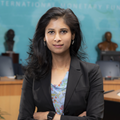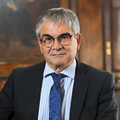Fiscal Forum: Leveraging Fiscal Rules and Frameworks to Navigate Today's Fiscal Challenges

IMF SEMINAR EVENT
DATE: April 20, 2024
DAY: Saturday
11:00 AM - 12:15 PM
LOCATION: IMF HQ1 3rd floor Meeting Hall A&B
Overview
The high-level panel discussion will be the fourteenth session of the IMF Fiscal Forum. The discussion will cover cross-country experiences and challenges in designing and implementing rule-based fiscal frameworks. At this juncture, large fiscal deficits and the surge in public debt seen in many parts of the world pose fiscal risks. These are compounded by the growing budgetary pressures from climate, aging, and meeting sustainable development goals. How can countries leverage fiscal rules and frameworks, balancing the need for flexibility in stabilizing the economy in a shock-prone world with the need to preserve the credibility of fiscal policy? How should countries accommodate growing budgetary demands within credible frameworks? The panel will bring in senior policymakers to discuss the fiscal rules in light of their recent experiences and examine the practical challenges countries face.Join the conversation via #FiscalForum
Fiscal Forum: Leveraging Fiscal Rules and Frameworks to Navigate Today's Fiscal Challenges
Panelists
Moderator: Vitor Gaspar

Vitor Gaspar is Director of the Fiscal Affairs Department at the IMF. He joined in 2014. Before that, he was Portuguese Minister of State and Finance from 2011–13 and has held various positions in European and Portuguese institutions, including head of BEPA at the European Commission, director-general of research at the European Central Bank, director of Economic Studies and Statistics at the Central Bank of Portugal, and Director of Economic Studies at the Portuguese Ministry of Finance. Mr. Gaspar holds a Ph.D. and a post-doctoral agregado in Economics from Universidade Nova de Lisboa; he graduated from Universidade Católica Portuguesa.
Panelist: Gita Gopinath

Gita Gopinath is the First Deputy Managing Director of the International Monetary Fund (IMF). She oversees the work of staff, represents the Fund at multilateral forums, leads the Fund’s work on surveillance and related policies, and oversees research and flagship publications. Previously, Ms. Gopinath was the Fund's Chief Economist. In that role, she helmed thirteen releases of the World Economic Outlook. She also worked with other Fund departments on a new analytical approach to help countries respond to international capital flows via the Integrated Policy Framework. Prior to joining the IMF, Ms. Gopinath was the John Zwaanstra Professor of International Studies and of Economics at Harvard University and before that she was an assistant professor of economics at the University of Chicago’s Booth School of Business. Her research, which focuses on International Finance and Macroeconomics, is widely cited and has been published in many top economics journals. She has authored numerous articles on exchange rates, trade and investment, international financial crises, monetary policy, debt, and emerging market crises.
Panelist: Sri Mulyani Indrawati

Sri Mulyani Indrawati has served as Finance Minister of Indonesia since 2016. She served in the same post from 2005 to 2010. From 2010–2016, she served as the Managing Director of the World Bank Group. From 2002–2004, she was an Executive Director at the Executive Board of the International Monetary Fund, representing 12 economies in Southeast Asia. She has been honored globally with awards such as the World's Best Minister at the World Government Summit in 2018 and the Distinguished Leadership and Service Award from The Institute of International Finance in 2021. In December 2023, the Australian National University awarded her an honorary Doctor of Laws, recognizing her substantial impact on economic development at both the national and international levels. She obtained her bachelor’s degree in economics from the University of Indonesia in 1986, she advanced her studies in the United States at the University of Illinois at Urbana-Champaign in 1992, earning a Master of Science in Policy Economics in 1990 and a Ph.D. in Economics in 1992.
Panelist: Mario Marcel

Mario Marcel is the Finance Minister of Chile. He holds a business degree from the Universidad de Chile and an M.Phil. in Economics from the University of Cambridge, United Kingdom. In 2015 he became a member of the Board of Governors of the Banco Central de Chile, and in 2016 he was appointed president, a position that he held until late January 2022. He was previously senior director of Governance Global Practice at the World Bank; deputy director of Governance and Territorial Development at the Organization for Economic Co-operation and Development (OECD); and manager of the Institutional Capacity and Finance Sector at the Inter-American Development Bank (IADB). For 13 years, he worked for the Government of Chile at the Treasury. He has also served as a consultant for international organizations and the governments of different countries such as Mexico, Colombia, Peru, and Vietnam. He has many publications on a wide range of topics in macroeconomics, public finance, monetary policy, governance and public management, social policies, and social security.
Panelist: Maarten Verwey

Maarten Verwey started his career in the European Commission in 2011 as deputy Director General for Economic and Financial Affairs. In 2015 he became Director General of the Structural Reform Support Service (now DG REFORM). He has been Director General for Economic and Financial Affairs since 1 February 2020. Before coming to the Commission, he was director of foreign financial relations in the Dutch Ministry of Finance. In these various capacities, he played a leading role in several important European initiatives. These include the creation of the EFSF and the ESM, the adjustment program for Cyprus, the creation of banking union, the investment plan for Europe (Juncker plan), the SURE facility and the Recovery and Resilience Facility. Most recently he steered the work on the review of the Stability and Growth Pact.







